WE NEED YOUR HELP! Perhaps you've read this before and are wondering, "Why am I seeing this again?" But millions of other Christians haven't seen it! So please use the "share" buttons above to share it with your social media friends. Thanks!!
Dear friend,
Please take a minute to read this important message:
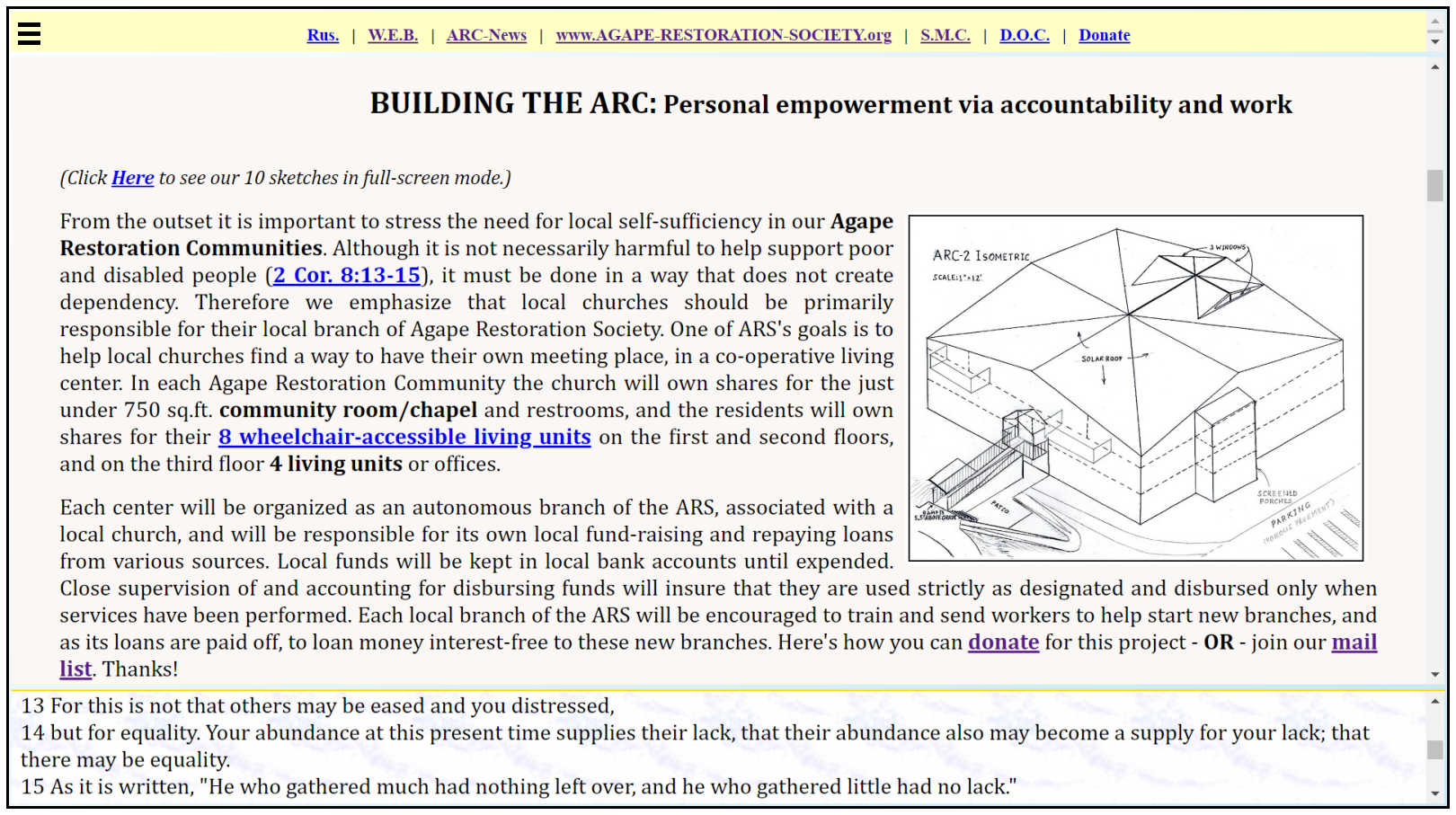 In my previous message, I told how at age 15, while taking care of lawns at an apartment complex, God gave me a vision: I saw a map of the Soviet Union in the sky and a voice said: "Remember this apartment complex plan - you'll build it when you're an old man." After serving behind the Iron Curtain and in Russia for 20 years, leading a small mission support agency for 20 years, and teaching online in Russian seminaries for 10 years, I'm now in my upper-70s, so I guess I'm old enough to start this new project!
In my previous message, I told how at age 15, while taking care of lawns at an apartment complex, God gave me a vision: I saw a map of the Soviet Union in the sky and a voice said: "Remember this apartment complex plan - you'll build it when you're an old man." After serving behind the Iron Curtain and in Russia for 20 years, leading a small mission support agency for 20 years, and teaching online in Russian seminaries for 10 years, I'm now in my upper-70s, so I guess I'm old enough to start this new project!
I wrote earlier about our *free* 1-year, 6-course training program "Social Ministry of the Church" in English and Russian to train people how to care for the sick and disabled. The purpose of these courses is to prepare people for "Building the ARC" - an Agape Restoration Community - a Christian housing co-op with a built-in community room/chapel. Most of the units will be wheelchair-accessible because of the aging of the "Baby Boomer" generation: 76 million people born between 1946 and 1965 have reached or are reaching retirement age (10,000/day = 3,650,000/year!), at which time 45% of these people are already disabled.
And as they continue aging, 70% of them will become disabled and require accessible housing or home healthcare before they pass away. This is a huge social concern: 70% of 3,650,000 people = 2,550,000 disabled people per year for the next 20 years = over 50 million people! About 2/3 of all retirees depend on Social Security for over half of their income, and about 1/3 of retirees depend on it for 90% to 100% of their income. But can they continue depending on it? Medicare will be insolvent by 2026 and Social Security will reach insolvency by 2034, the trustees of these funds report, so they will have to cut 'way back: they won't be able to care for all these people at current levels. We need to "Think Forward" ... starting now!
Our basic problem, however, is that like most people, we don't want to think about such things until it's too late. Psychologists call this "the normalcy bias" - our brains work in terms of past experience, so we assume that everything will simply keep on going on "just like normal" as it has in the past. As King David wrote - "Their inward thought is that their houses will endure forever, and their dwelling places to all generations. They name their lands after themselves. But man, despite his riches, doesn't endure. He is like the animals that perish" (Psalm 49:11-12). In everyday layman's language it's called "whistling past the graveyard." We don't want to think about unpleasant things such as growing old, disability, and death... so when it happens, we're unprepared and too feeble to respond adequately, thus we become a burden on the government. But some states are already passing laws allowing euthanasia and assisted suicide to conserve public finances. So it's imperative that we as Christians be proactive and retake our social ministry responsibilities!
Christ commanded His disciples to "Bring in the poor, the maimed, the lame and the blind, go into the highways and the hedges, and compel them to come in, so that My house may be full" (Luke 14:21-23). This defines our ultimate target audience and our goal, but how can we "compel them to come in" unless they can come in? Why aren't the churches full? In many cases the "maimed, the lame and blind" can hardly get out of their homes, and getting transported to church is difficult or flat-out impossible.
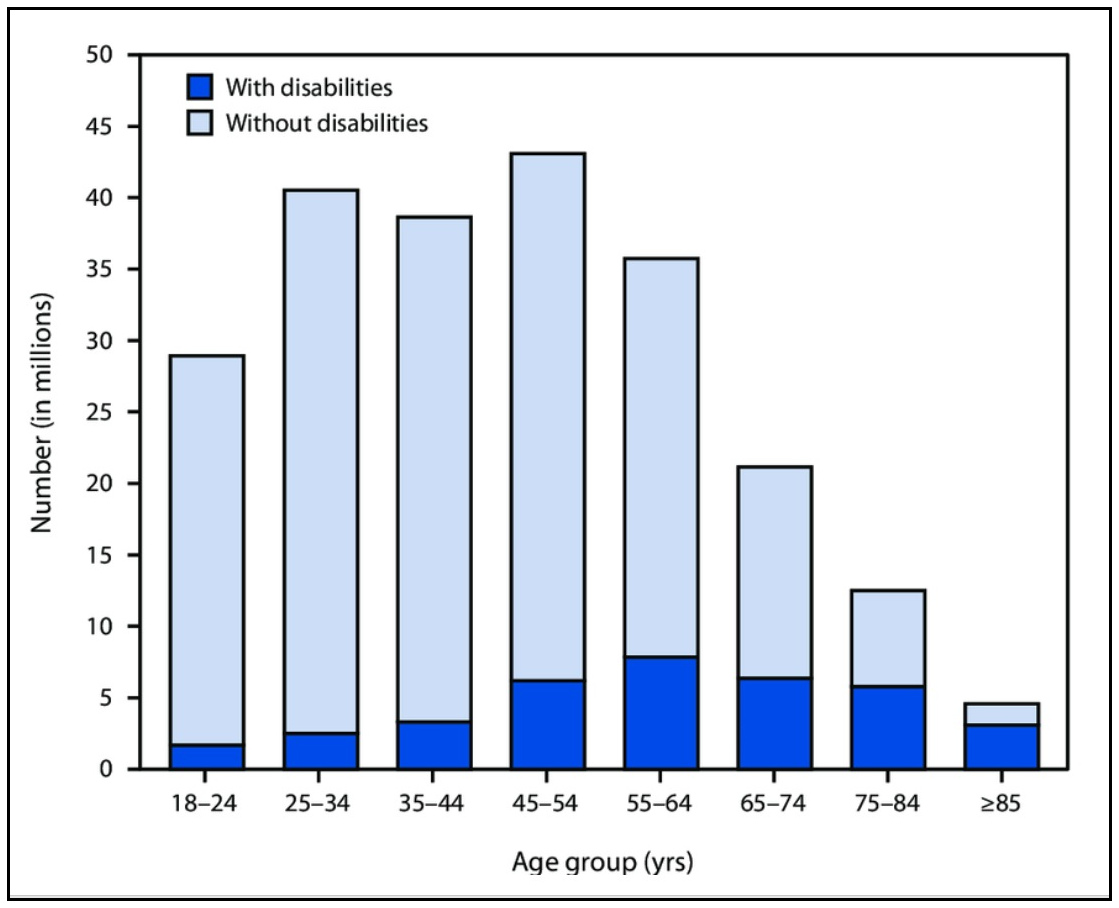 Most homes, condo and townhouse communities in our greater Pittsburgh area, on the northern edge of the Allegheny Mountains, have at least 1/2 to 1 flight of stairs, often 2 or 3 flights, creating a nearly-insurmountable problem for people with disabilities. Our hearts go out to the 6% of children who are disabled! But 16% of working-age adults and 45% of seniors have disabilities too. 16% + 45% = 61% of disabled people are adults: only 1/10th as many (6%) are children, so shouldn't we pay a bit more attention to those ten-times-as-many disabled adults?
Most homes, condo and townhouse communities in our greater Pittsburgh area, on the northern edge of the Allegheny Mountains, have at least 1/2 to 1 flight of stairs, often 2 or 3 flights, creating a nearly-insurmountable problem for people with disabilities. Our hearts go out to the 6% of children who are disabled! But 16% of working-age adults and 45% of seniors have disabilities too. 16% + 45% = 61% of disabled people are adults: only 1/10th as many (6%) are children, so shouldn't we pay a bit more attention to those ten-times-as-many disabled adults?
Also, many church buildings aren't very wheelchair-accessible. Solution: "Build the ARC": this is a 12-living-unit building that forms an accessible, affordable Christian housing co-op including a community room/chapel, with most living units being wheelchair-accessible by including a ramp from the entrance, plus there are parking spaces just outside wide enough for wheelchair use right next to the building. And our "Social Ministry of the Church" courses will train the healthier residents as "home healthcare workers" to care for those who need it.
 Why not an elevator or a stair lift? In an emergency such as a fire or when the electricity goes out or the elevator breaks, they could be trapped if depending on an elevator or a stair lift. Disabled people can't use the stairs and it's awfully hard to carry them in a wheelchair down the stairs – we've learned that the hard way! With most older couples it's the man who ages first and becomes disabled: he very likely weighs more than his wife who often injures her back or knees trying to lift or carry him. Also, we've met many older people – able-bodied and disabled – who have been trapped in an elevator so now refuse to ride them, but some are too disabled to use stairs. Armed with such experiences, we aim to change the built environment for these people!
Why not an elevator or a stair lift? In an emergency such as a fire or when the electricity goes out or the elevator breaks, they could be trapped if depending on an elevator or a stair lift. Disabled people can't use the stairs and it's awfully hard to carry them in a wheelchair down the stairs – we've learned that the hard way! With most older couples it's the man who ages first and becomes disabled: he very likely weighs more than his wife who often injures her back or knees trying to lift or carry him. Also, we've met many older people – able-bodied and disabled – who have been trapped in an elevator so now refuse to ride them, but some are too disabled to use stairs. Armed with such experiences, we aim to change the built environment for these people!
We've been functioning since 1998 as Agape Restoration Society, a donor-advised fund of WaterStone.org, a foundation through which people can channel their benevolent donations but only to other non-profits; also, they charge us a processing fee for each donation. So in 2017, we incorporated as Agape Restoration Society Inc., an IRS-recognized non-profit corporation, so that we can disburse funds to for-profit architects and builders. We are listed with Charity Navigator and GuideStar. Here are our sketches for the proposed building. Enroll in our free courses to see how YOU can do diakonia-ministry. And Join "The ARC" Chat/Video Forum to Build the ARC!
Can you help us? What we really need is for 500 or 1,000 or 2,000 people to Help Us Raise a Crowd of Followers, or to Chip In at one of these levels by going to our DONATE page and signing up for:
$100/month for 10 months: that's $1,000 - a huge help, or
$50/month for 10 months: that's $500 - a great gift, or
$25/month for 10 months: that's $250 - a big boost, or
$10/month for 10 months: that's $100 - practically painless!
Will you be praying for and pulling for us in this project? Thanks for your time and attention, if you've read this far!
Yours sincerely,
"Dr. Bob"
Robert D. Hosken, M.Min., M.Th.S., D.Min.
Click on the "Share" buttons above TO SHARE THIS ↑ ESSAY, and click on Contact to WRITE YOUR COMMENTS.
Also, enroll in our free courses to see how YOU can do diakonia-ministry:
![]()
PLEASE CONSIDER GIVING $5 TO SUPPORT OUR MINISTRY:
Keep our websites free! Make a quick one-time donation at  PayPal.me/AgapeRestoration or use our QR code →
PayPal.me/AgapeRestoration or use our QR code →
OR go to our Support page and select "donate monthly."
And please Share Our Vision with your family & friends!
My wife and I left our careers 30 years ago to serve in Russia as missionaries: we're now "semi-retired" – we've put on a new set of semi tires and keep on trucking! We live on our retirement income and volunteer our time: we receive no financial support from Agape Restoration Society. Our websites and ministry are funded by just a few friends and us. So if just 5% of the people who see this would give $5 per month (just 17¢ per day!) – a cup of coffee at Starbucks – we could cover our operating expenses, and do much more in spreading the word, serving and providing accessible housing for the disabled. ...thanks in advance!
NEXT, THE NEWS:
WATCH: JESSICA HAD NO SUPPORT AT ALL WHEN SHE BECAME PREGNANT. THEN A MIRACLE HAPPENED.
from: LiveAction News
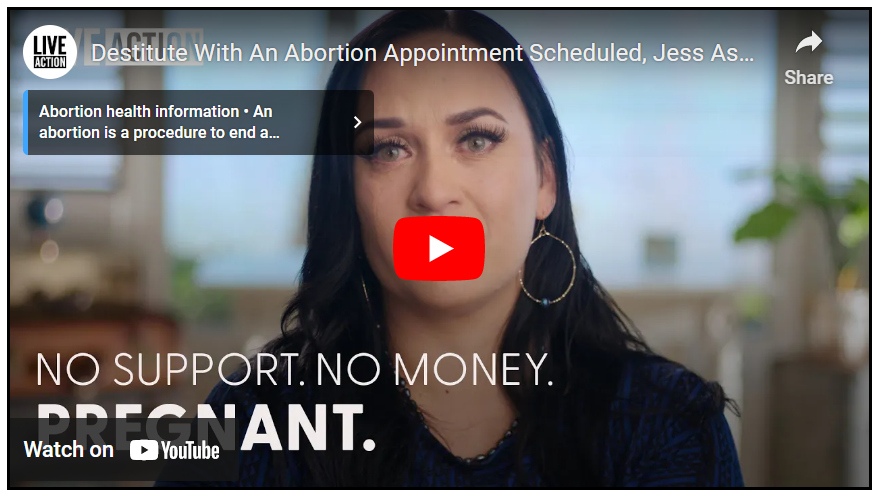 ← Watch the video! (14 Feb.) Jessica Barnes was a 21-year-old college student when she learned she was pregnant. She struggled with the idea of having an abortion but felt guilty about having a child when she had no money and no home. After rescheduling her abortion multiple times, she begged God to tell her what to do, and He stepped in to prevent her abortion from happening.
← Watch the video! (14 Feb.) Jessica Barnes was a 21-year-old college student when she learned she was pregnant. She struggled with the idea of having an abortion but felt guilty about having a child when she had no money and no home. After rescheduling her abortion multiple times, she begged God to tell her what to do, and He stepped in to prevent her abortion from happening.
"I had met an older guy. When I found out the guy that had got me pregnant had a drug addiction – there was really no chance of me relying on him at all, and so I’m really alone in this," she explained in a video for Live Action. "I wasn't in communication with my father at that point and my mother had died. I have no money. I have no home. I would be living off of food stamps. I live in Hawaii, one of the most expensive states in the entire world to live in. I'm young. I'm in college. I have no experience with children. I was just the perfect person that Planned Parenthood would suggest to have an abortion."
Jessica felt that there was no hope for her. She felt immense guilt about bringing a child into the world when she had no money and no home. She scheduled an abortion but said she "hated" herself for it. She canceled the appointment, then rescheduled, then canceled, then rescheduled a third and fourth time. For the fourth appointment, the clinic staff "aggressively" told her she could not cancel again or she would have to have the baby because she was approaching the cut-off date for a legal abortion.
She begged God for help. "I told God, ‘I need you to physically stop me because from what my human eyes can see, I don't see a way,'" she said. […] "‘You need to physically send down the angels and stop me because I don't want to do this but I don't see a way out.'"
On the way to the abortion appointment, the car her baby's father was driving went down the highway exit ramp and spun out of control. As the car stopped, they realized they had a flat tire and pulled over. When he went to get the new spare tire out of the trunk, it was also deflated.
Jessica looked up at a large clock on a building, and it was 15 minutes beyond her appointment time. She had missed her final abortion appointment.
"I've asked God for signs many times. He's given me nudges and things like that but nothing like the Holy Spirit that I experienced that day," said Jessica. "I was at complete peace and I was like, ‘Get in the car. I'm not having this abortion.' And I never hesitated after that and I never regretted any second after that moment."
Since that day, God brought a lot of women into her life who had been through similar circumstances. She found support and she gave birth to a boy, Ezekial, who is a sweet, generous soul.
"Ezekial is the most selfless person I've ever met," she said. "When we pass anyone unfortunate on the side of the road, he tells me, ‘Mom, we have to feed that person; we have to help them.' […] He's my child but he's constantly teaching me things and he's just a blessing. God fought for him and I pray that he does great things and that he shows everyone the love of God." [read more...]
COMMENTARY: The Lord listens to prayers from our hearts, as this story illustrates. We thank the Lord for His stepping in to keep Jessica from aborting her unborn child, who turned out to be a great blessing to her and to others. But think about the many millions of potential blessings to the world have been snuffed out by abortion. Let us pray for an end to this monstrous evil!
CANADA MOVES TOWARD EUTHANASIA FOR CHILDREN
from: BioEdge.org
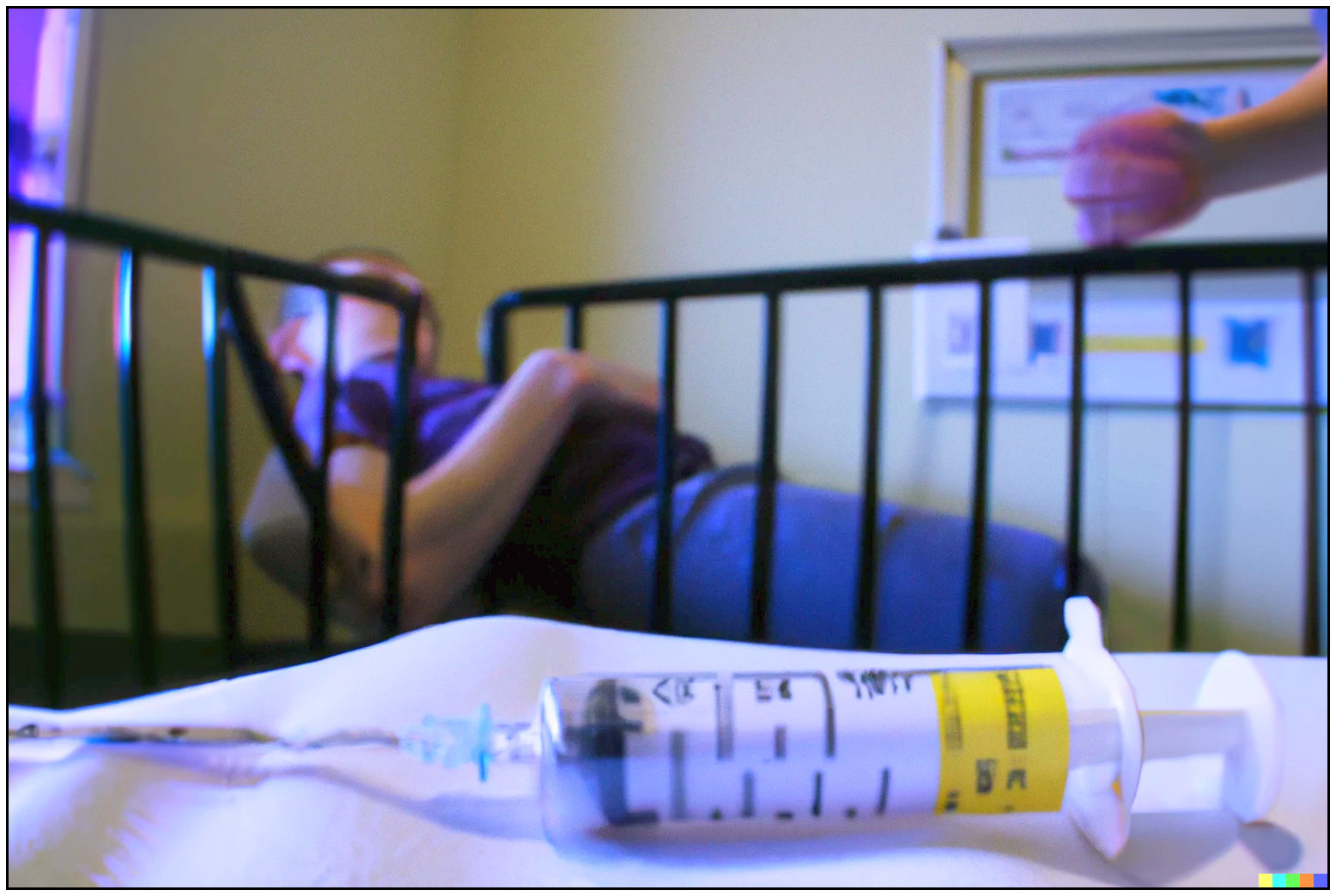 (21 Feb.) Canada is moving rapidly towards an even more permissive euthanasia regime. A report by the Special Joint Committee on Medical Assistance in Dying to Parliament makes several recommendations which have been widely criticised as dangerous and even reckless.
(21 Feb.) Canada is moving rapidly towards an even more permissive euthanasia regime. A report by the Special Joint Committee on Medical Assistance in Dying to Parliament makes several recommendations which have been widely criticised as dangerous and even reckless.
Prisoners. prisoners should have the same access to healthcare, including MAiD, as those living in the community. Several prisoners have already died under MAiD in Canadian prisons. However, the report recommends compassionate release into the community so that prisoners whose death is reasonably foreseeable can die outside the Big House.
"Mature minors." The recommendations for euthanasia for children are highly controversial. At the moment, the cut-off for eligibility is 18, but the MPs want to permit younger people to access MaiD if they are "mature minors."
There is no defined age at which a child becomes a "mature minor." In the Netherlands 12-year-olds can be given euthanasia. In Belgium there is no age limit as long as a child has the "requisite capacity." Could a 9-year-old make a serene and fully informed request? The report suggested that the term be defined more carefully.
The report recommends that mature minors be allowed to access euthanasia, but only if their death is reasonably foreseeable. Should their parents be involved? Not necessarily. The report recommends that "where appropriate, the parents or guardians of a mature minor be consulted in the course of the assessment process for MAiD." However, "the will of a minor who is found to have the requisite decision-making capacity ultimately take priority."
So, it is quite conceivable that the parents could find out that their child had asked for and been granted MAiD only after the child is dead. It would be even more tragic if she were only 9.
Furthermore, although the report recommends caution, it notes that it may not be constitutional to limit requests to children whose death is "reasonably foreseeable."
Advance directives. The report endorses "advance requests following a diagnosis of a serious and incurable medical condition disease, or disorder leading to incapacity." In other words, people will be able to request that they be given a lethal injection after they have lost full capacity because of dementia. The discussion in the report appears to assume that the request should be written, but, tellingly, does not specify this. So it might be possible for relatives to remember verbal instructions made when a person was compos mentis. [read more...]
COMMENTARY: The idea of permitting children to commit suicide and providing them the means is another monstrosity. It is clear that forces of evil are at work in this world, convincing post-Christian, neopagan societies that human life is only of value when it produces wealth or pleasure. In reality, we possess intrinsic value because we are created in God's image to share in His glory.
TAJIKISTAN: AILING PRISONER OF CONSCIENCE AGAIN FAILS IN HOSPITAL TRANSFER BID
from: Forum 18 News Service
Hebrews 13:3 – "Remember those who are in bonds, as bound with them; and those who are ill-treated, since you are also in the body."
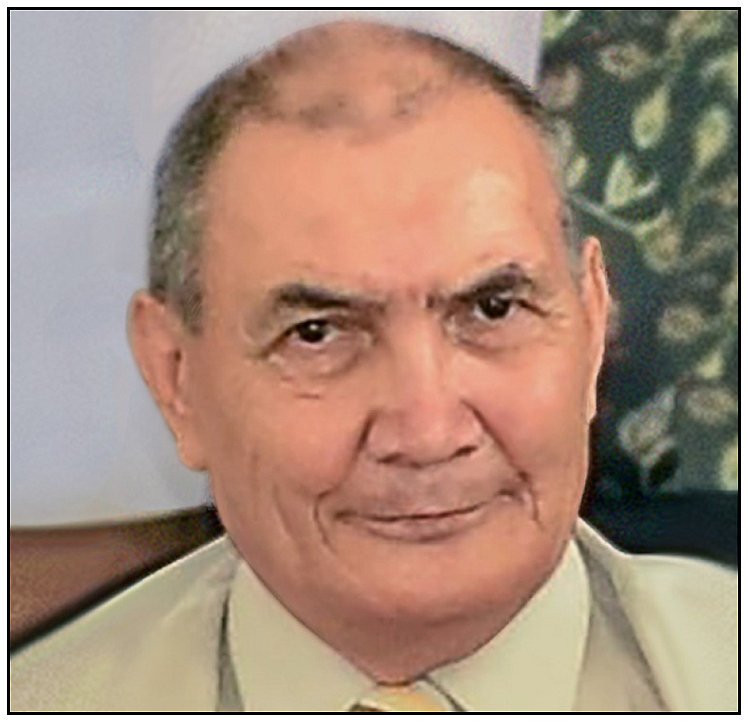 (22 Feb.) Jehovah's Witness prisoner of conscience Shamil Khakimov has failed in his latest attempt to gain transfer to a hospital for urgently-needed specialised medical care. On 15 February, and in his absence, Sugd Regional Court rejected his appeal against a lower court denial of his suit for early release. The 72-year-old has multiple medical conditions, including signs of gangrene in his legs, serious eyesight problems, and frequent severe headaches.
(22 Feb.) Jehovah's Witness prisoner of conscience Shamil Khakimov has failed in his latest attempt to gain transfer to a hospital for urgently-needed specialised medical care. On 15 February, and in his absence, Sugd Regional Court rejected his appeal against a lower court denial of his suit for early release. The 72-year-old has multiple medical conditions, including signs of gangrene in his legs, serious eyesight problems, and frequent severe headaches.
Forum 18 asked the governor of Strict Regime Prison YaS 3/5 in Khujand, Colonel Jamoliddin Khushbakhtzoda, why the prison authorities have not transferred Khakimov to hospital for the specialised treatment he needs. Without answering, Colonel Khushbakhtzoda put the phone down. Subsequent calls were not answered.
Arrested in February 2019, Khakimov was jailed for books, other literature, photos, videos, audios, computer files, and mobile phone data seized from him and other Jehovah's Witness community members, which the Prosecutor's Office claimed contain "features of extremist activity." He is now due for release from prison on 16 May 2023, aged 72, after which he will be banned from exercising his freedom of religion and belief until May 2026.
The 59-year-old Ismaili religious leader from Khorugh in Mountainous Badakhshan, Muzaffar Davlatmirov, was transferred to the General Regime Prison YaS 3/6 in Yavan in August 2022 soon after being jailed for five years. His jailing came amid a regime crackdown in the region. Forum 18 has been unable to find out if he can pray undisturbed in prison, and whether he is able to have religious books of his choice. The telephone [calls to] Prison YaS 3/6 were not answered.
Prison administrations often violate the rights of prisoners to exercise freedom of religion or belief during their sentences. The UN Standard Minimum Rules for the Treatment of Prisoners (known as the Mandela Rules) say such rights must be respected and note: "Every prisoner shall be allowed to satisfy the needs of his or her religious life by ... having in his or her possession the books of religious observance."
The Prisons Department of the Justice Ministry's Chief Directorate for the Enforcement of Criminal Punishments in Dushanbe refused to discuss the cases of any of these prisoners.
No one at the regime's State Committee for Religious Affairs and Regulation of Traditions, Ceremonies and Rituals (SCRA) would discuss anything with Forum 18 between 14 and 21 February. The men who answered the phones on 14 February of First Deputy Chair Amirbeg Begnazarov and of the head of the International Department Abdugaffor Yusufov put the phone down as soon as Forum 18 introduced itself. Subsequent calls to other SCRA officials were not answered.
An official of the regime's Human Rights Ombudsperson's Office in the capital Dushanbe refused to discuss anything with Forum 18 on 21 February. He said Mukim Ashurov (Head of its Civil and Political Rights Department) and Rachabmo Habibulozoda (Head of its Economic, Social and Cultural Rights Department) were both away on a work trip. Their phones were not answered on 22 February. [read more...]
COMMENTARY: Although I disagree strongly with the heretical doctrines of the Jehovah's Witnesses, I support this man's right to be treated humanely when he is suffering from serious medical problems. To deny medical help to him is a form of physical and psychological torture.
CLINICIANS GET GUIDANCE ON TREATING SEVERE AUTISM BEHAVIORS
from: Disability Scoop
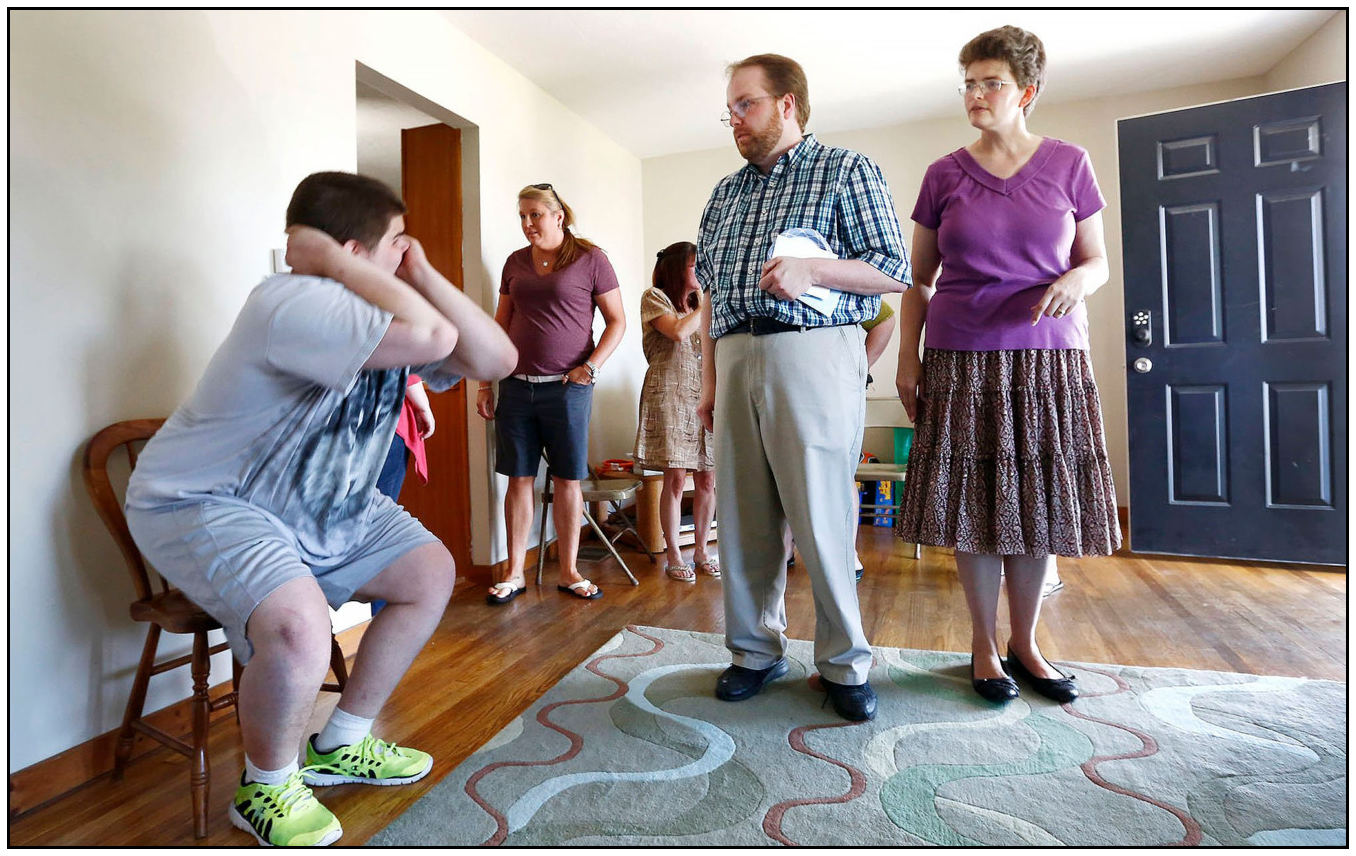 (13 Feb.) Andrew Butler, left, lets his parents, Mark and Susan, know that he wants to leave and go for a car ride. The Butlers gave up custody of their son, who has autism, so that he could receive support to deal with severe behaviors. Individuals with autism and other developmental disabilities are at higher risk of self-injury, aggression and other severe behaviors, but families are often unable to access effective treatments. A new guide for clinicians is designed to change that.
(13 Feb.) Andrew Butler, left, lets his parents, Mark and Susan, know that he wants to leave and go for a car ride. The Butlers gave up custody of their son, who has autism, so that he could receive support to deal with severe behaviors. Individuals with autism and other developmental disabilities are at higher risk of self-injury, aggression and other severe behaviors, but families are often unable to access effective treatments. A new guide for clinicians is designed to change that.
The five-part document from Autism Speaks offers pediatricians and other clinicians background information on challenging behaviors and details how to screen for and assess these issues as well as guidance on evidence-based treatments. It also includes a toolkit for centers looking to create a successful program to treat severe behaviors.
"Despite the prevalence of these behaviors, the majority of families lack access to appropriate and effective treatments," said Jacqueline Perlmeter, program manager of clinical programs at Autism Speaks. "This lack of access to quality care can lead to poor treatment outcomes, limitations on skill development, poorer quality of life and inability to participate in the community that they live in. In addition, these behaviors can lead to substantial physical and emotional harm to themselves and others."
In light of that, Autism Speaks brought together leaders in autism care and research as well as individuals with autism and family members in 2020 for its Thought Leadership Summit on Challenging Behaviors. Work groups formed after the summit established several recommendations and priorities that served as the basis for the guide for clinicians.
"This is a highly underserved segment of our community who often cannot access the behavioral and mental health services they need, leading to worse outcomes and a higher likelihood of crisis situations," Perlmeter said. "By publishing this guide, we are working to ensure that local providers – not just autism specialists – have the knowledge and skills they need to effectively serve this population."
The guide indicates that severe behaviors can include head banging and other self-injurious behaviors; aggression like hitting, kicking and biting; pica (compulsively swallowing non-food items); property destruction and other disruptive actions; as well as elopement. Challenging behavior can present differently in each individual with autism, the guide notes.
Autism Speaks said that a separate guide aimed at helping families learn about severe behaviors and how to access care is also in the works. [read more...]
COMMENTARY: Children with autism need special care by trained persons and the facilities and medicines that can alleviate many of the behavioral issues these children experience. To neglect these needs when we are able to provide for them is immoral. "Love your neighbor" includes loving and caring for special needs persons who are hard to handle.
PARTICIPANTS OF INTER-CHURCH DIALOGUE IN ST. SOPHIA OF KYIV ADVISED UOC-MP AND OCU TO START UNIFICATION
from: Religious Information Service of Ukraine
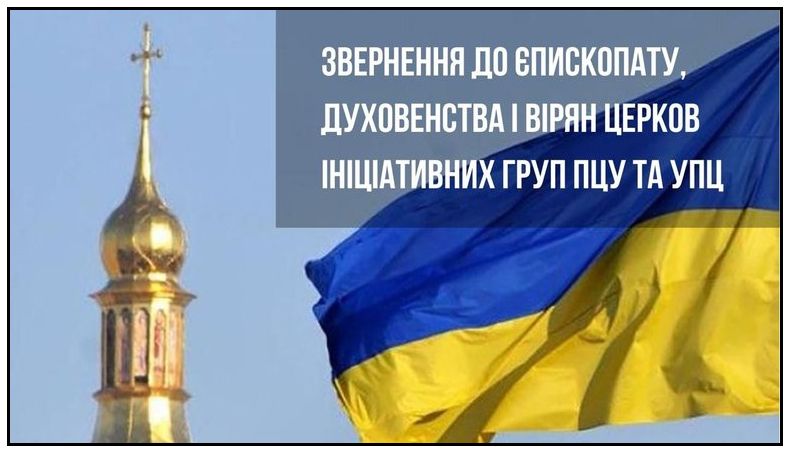 (21 Feb.) Representatives of the initiative groups of the OCU and UOC published an appeal to the episcopate, clergy and faithful of Churches, in which they suggested that both faiths begin the process of unification.
(21 Feb.) Representatives of the initiative groups of the OCU and UOC published an appeal to the episcopate, clergy and faithful of Churches, in which they suggested that both faiths begin the process of unification.
"In this difficult time, it is crucial to preserve the spiritual unity of the Ukrainian people, the origins of which go back to the ancient Kyiv Orthodox tradition. Therefore, we strive to achieve the unification of all Orthodox Ukrainians in a single conciliar and local (autocephalous) Ukrainian Orthodox Church, recognized by the entire Christian Orthodox world. We understand that the path may not be easy, but it is our duty to start this movement," the statement reads.
The UOC and OCU recommend rebooting the relationship and changing the information policy in order to prepare the basis for dialogue.
Both faiths are invited to start cooperation in cultural and educational projects, serve together during cultural and religious events, as well as during the burials of Ukrainian defenders. The participants of the interchurch dialogue also called on both denominations to recognize the church sacraments in order to overcome barriers to Eucharistic communion between the communities of both churches.
"We call for a direct dialogue without any preliminary conditions to develop models that would make it possible to unite the UOC and the OCU into a single Local Church in the future. To this end, we propose to create a joint working group, which will include bishops and professional theologians of the local Orthodox Churches, to develop a step-by-step plan of unity. We also expect the leadership of the UOC and the OCU to make public a clearer position on inter-Orthodox dialogue," the statement reads.
Address of the participants of the interchurch dialogue in St. Sophia of Kyiv to the bishops, clergy and faithful of the Ukrainian Orthodox Church and the Orthodox Church of Ukraine:
I. Russia's armed aggression against the sovereign Ukrainian state was the culmination of centuries-old imperial pressure on the spiritual and cultural identity of our people. Guided by the imperial and chauvinist ideology, under the slogans of the Russian World, Russia has always denied the right to the existence of a local Ukrainian Church. The Russian Orthodox Church invades the canonical territory of Ukrainian churches and blesses Russia's occupation actions and war crimes on the territory of the Ukrainian state.
II. In this difficult time, it is crucial to preserve the spiritual unity of the Ukrainian people, the origins of which go back to the ancient Kyiv Orthodox tradition. Therefore, we strive to achieve the unification of all Orthodox Ukrainians in a single conciliar and local (autocephalous) Ukrainian Orthodox Church, recognized by the entire Christian Orthodox world. We understand that the path may not be easy, but it is our duty to start this movement.
III. We are aware that among a significant part of the clergy and laity of the two Ukrainian Orthodox jurisdictions, there is a deep alienation, distrust and the formation of the "image of the enemy," which leads to mutual dehumanization. That is why we insist on the need to reset our relationships, feel a mature need to renew our relationships, get rid of old claims and prejudices. It is also important to change the information policy and rhetoric of mutual depreciation of representatives of both churches (UOC and OCU) in order to form the prerequisites for dialogue. The Ukrainian episcopate should rise above corporate interests and start a dialogue for the sake of unity.
A significant part of the faithful and clergy of the Ukrainian Orthodox Church is convinced of the illegality of changing the subordination of religious communities, and also expresses doubts about the canonical legitimacy of the OCU hierarchy. But the Ukrainian society and the OCU believers demand that the UOC leadership more strongly condemn the manifestations of collaboration between individual representatives of the UOC clergy. The Ukrainian state under martial law is concerned about the preservation of the destructive influence on society of structures that are subordinate to the aggressor state. Therefore, draft laws are being initiated that would make it impossible for religious organizations affiliated with the center of influence in the aggressor country to break the church-canonical connection with the Moscow Patriarchate.
With this in mind, we perceive the state and Civil Society of Ukraine as important participants in the dialogue of unity between the UOC and the OCU. We see the prospect of relations between Orthodox churches and the state and society based on the principles of the rule of law, mutual respect and partnership. Therefore, we call for a broad discussion of those legislative initiatives that relate to complex and often painful issues of religious life. [read more...]
COMMENTARY: This is a groundbreaking announcement! How realistic is it that the UOC-MP and the OCU could unite? We should prayerfully hope for and work for this to happen. The Orthodox believers of Ukraine should not be forced to choose sides in this war.
WHEN YOUR CHILD IS DISABLED – ADVICE FROM A WISE WOMAN I WISH I HAD FOLLOWED
from: Disabled World
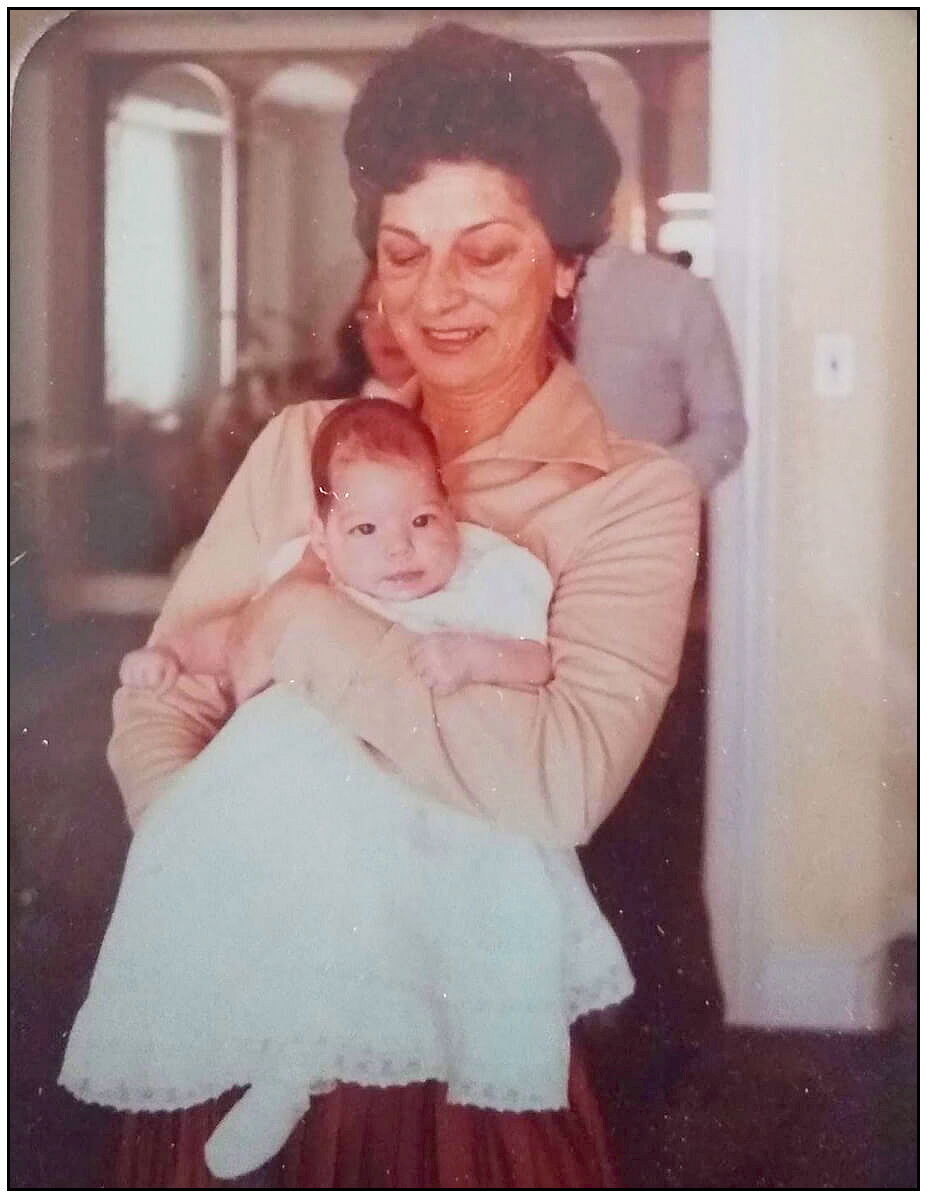 (21 Feb.) Sometimes, things can't be fixed, and we have to give children and families information and instructions on how to live to the fullest with a disability. If you have experienced the disability diagnosis of a family member, you understand how devastating and heartbreaking it can be. The trouble with many educational theories and practices is that what is suitable for one child may only be helpful for some children.
(21 Feb.) Sometimes, things can't be fixed, and we have to give children and families information and instructions on how to live to the fullest with a disability. If you have experienced the disability diagnosis of a family member, you understand how devastating and heartbreaking it can be. The trouble with many educational theories and practices is that what is suitable for one child may only be helpful for some children.
My younger sister is legally blind, hard of hearing and intellectually disabled. If she was a young child today, she would probably be diagnosed as autistic. My oldest daughter suffered from severe seizures after her birth, most likely due to hypoxia during her birth. She has been diagnosed with a significant intellectual impairment, cerebral palsy and an acquired microencephalopathy. If you have experienced the disability diagnosis of a family member you understand how devastating and heartbreaking it can be. The grief can be overwhelming. The way you deal with that grief can also be overwhelming.
The Advice I Wish I had Followed
There are two words my mother said while trying to comfort me after our daughter, Tricia, was born. They were, "enjoy her." I know now, as I look back, she was expressing her feelings when raising my sister. I wish I had listened to her. Instead, I tried to "fix" my daughter. I enrolled her in early intervention, hired physical, and occupational therapists to supplement the therapy she was receiving in her early intervention program. The more I increased Tricia's services the more irritable she became.
I studied articles and developmental charts hoping to find information that, even though Tricia was at risk for being disabled, she was developing normally. One day, one of my husband's friends commented that I was acting more like Tricia's teacher than as her parent! He was right! Yes, I love Tricia with all my heart, but did I enjoy those first years of her life? No, In my grief I was trying to make her normal.
Tricia was born during the time that early intervention services were in their infancy. I am grateful for the services Tricia received, but sometimes I think I was misled by the belief that the more services a disabled child receives the more they will achieve. At the time, I believed that. The trouble with many theories and practices in education is – what is right for one child may not be helpful for all children.
Sometimes, things can't be fixed. Sometimes we have to give children and families information and instructions on how to live to the fullest with the disability. Instead of grieving over what we can't fix, we need to learn to enjoy what we do have. Only then will you find enjoyment and become resilient. [read more...]
COMMENTARY: People sometimes have physical, psychological, or mental problems that can't be fixed. People are more than machines to be repaired or disposed of when they break down or wear out: they are persons, living souls and spirits that are sometimes trapped in a malfunctioning body. We should enjoy them as persons by recognizing we all are created in God's image, even if it is marred.
NOW, OUR VIEWS:
 The first commandment the Lord gave to Moses is to have no other gods besides Him. But as the article "Perun, Slavic God of the Sky and Universe" explains, the slavic god Perun is for many Russians "the supreme god, the god of thunder and lightning, who owned the sky and acted as the patron saint of ruling army units. He is one of the few Slavic gods for which evidence exists at least as long ago as the 6th century CE."
The first commandment the Lord gave to Moses is to have no other gods besides Him. But as the article "Perun, Slavic God of the Sky and Universe" explains, the slavic god Perun is for many Russians "the supreme god, the god of thunder and lightning, who owned the sky and acted as the patron saint of ruling army units. He is one of the few Slavic gods for which evidence exists at least as long ago as the 6th century CE."
Both ancient and many modern Russians believe that Perun is "god" ("bog" in Russian) or the top "dog" spelled backward, equivalent to the Greek Zeus or the Norse Thor gods of war. His consort is said to be Mokosh, goddess of the sun. "As the liberator of atmospheric water... he was worshipped as a god of agriculture, and bulls and a few humans were sacrificed to him."
Not a few Russians still worship and emulate this pagan warrior god Perun. When we lived in Mari El, one of the republics of central Russia, a close friend told us how thousands of Russians gather yearly to reinact pagan battles that include the god Perun. Newspapers are full of ads about non-Christian beliefs and the occult. Even some Orthodox churches in Moscow had booklets about paganism on their literature racks. When seeing this, I realized how deeply entrenched warlike paganism is in the Russian psyche. Mari El, by the way, is the only government in modern Europe that has paganism as its official state religion.
The 2018 article "Russian Soldiers, Athletes Are Turning to Paganism, Top Church Leader Says" tells of a growing trend of soldiers turning to paganism. It also mentions Mari El where we lived. When we moved to its capital city Ioshkar-Ola ("red city") in 2016, I took a walk to explore the downtown area and saw a little souvenir shop. As I entered, I experienced an extremely creepy feeling of evil and saw a pagan idol on display, so I immediately left the shop.
A common feature of both Mari El and the Udmurt republics where we lived is a "dual belief" system: people will baptize their children, marry them off and bury them in the Orthodox Church, while at the same time in their daily lives practicing paganism. Another article, "More Russian than Orthodox Christianity: Russian Paganism as Nationalist Politics," explains this phenomenon:
"The collapse of the communist system in Eastern Europe enabled the few small pagan movements in the region to surface in the public sphere. At the beginning of the 1990s, they gained momentum in virtually all ex-socialist countries. The majority of these groups subscribed to nationalist politics, but naturally the nature of this nationalism varies between countries. Whereas in Central and Eastern Europe native paganism is often seen as an inherently anti-Soviet and anti-Communist force, Russian pagans' relationship with their past is more complex. Despite this, pagans from Slavic countries have cooperated, especially in a yearly assembly, Veche, in advocating a pan-Slavic nationalist ideology." (emphases mine)
So you can see the connection between a rebirth of paganism in Russia and the trend toward an aggressive form of pan-Slavic nationalism. The article also includes a link the free PDF of the 297-page book The Geopolitics of Faith in the Twenty-First Century (Creative Commons license).
The Moscow Times recently published "How Russia's FSB Embraced Religion in the Face of a Baffling War" that details how the FSB (formerly the KGB) that earlier enforced atheism is now using the Russian Orthodox Church to support Putin's "special military operation" – a euphemism for his invasion and crimes against humanity in Ukraine. It cites a Russian Orthodox priest, Fr. Andrei Tkachev, who stated: "it is much better to wipe out some equipment rather than 40,000 alongside it. We are waging war according to Christian principles because we are destroying transformers, not people who have an immortal soul." But Russia is doing both: destroying tens of thousands of people as well as transformers.
A Christian friend in Russia once told me – "There's a big difference between Russian Orthodoxy and Orthodox Christianity." But to be fair, I must add that we have known many Orthodox people in Russia who are deeply Christian, although the "dual belief" system is deeply engrained in Russian mentality. Thus it pains me greatly to watch and read the news about Russia's aggression and genocidal acts in Ukraine.
Fr. Gregory Jensen writes in "Russian War Crimes and Orthodox Moral Education" –
"Accusing the Russian military of committing crimes against humanity in Ukraine is not the same as accusing all Russians of war crimes. Much less is it to accuse individual Russians. At the same time, concerns about not giving offense to Russian[s] or of being misunderstood by those outside the Church should not prevent us from making these allegations when the evidence warrants:
Evidence continues to mount of Russian war crimes and crimes against humanity, including but not limited to:
* Massacres in occupied Bucha and Izyum.
* Deliberate air strikes against civilians, including apartment blocks and clearly marked shelters.
* The deportation of hundreds of thousands of Ukrainians to Russia, including the abduction of thousands of Ukrainian children from Russian-occupied territory.
* An ongoing effort to erase Ukrainian culture and cultural heritage from Russian-occupied territory.
These atrocities shouldn't come as a surprise given Moscow's horrific track record in Syria and elsewhere, but they nonetheless remain shocking and appalling in both scope and scale. No wonder high-level U.S. government officials ... have publicly and formally accused the Kremlin of committing crimes against humanity – crimes for which Putin and his cronies must be held accountable, unlike the pass Bashar al-Assad's regime in Syria has received.
I've spoken to many Orthodox Christians – clergy and laity – whose thinking about Russia's Invasion of Ukraine is confused. This confusion, I would ask you to consider, is symptomatic of the poverty of moral education both in our schools and especially in the Church. Many Orthodox Christians – like many American Christians – have never been exposed to the Church's moral tradition beyond a rather bare list of 'do's and don't's.'"
The disinformation campaign by Russia's government and church is designed to sow doubt and confusion in the West by claiming that the new Orthodox Church of Ukraine (OCU) is uncanonical because Ecumenical Patriarch has no right to grant it autonomy. Yet it is the Moscow Patriarch who has no right to grant autonomy to the old Ukrainian Orthodox Church (UOC-MP) or to the Orthodox Church of America. This is the old "divide and conquer" disinformation warfare technique, projecting one's own errors onto others. We must pray for a deep repentance and restoration of true Christianity in Russia!
(Get this as a separate article on our ARC-News blog at blogspot.com and share it!)
 In my previous message, I told how at age 15, while taking care of lawns at an apartment complex, God gave me a vision: I saw a map of the Soviet Union in the sky and a voice said: "Remember this apartment complex plan - you'll build it when you're an old man." After serving behind the Iron Curtain and in Russia for 20 years, leading a small mission support agency for 20 years, and teaching online in Russian seminaries for 10 years, I'm now in my upper-70s, so I guess I'm old enough to start this new project!
In my previous message, I told how at age 15, while taking care of lawns at an apartment complex, God gave me a vision: I saw a map of the Soviet Union in the sky and a voice said: "Remember this apartment complex plan - you'll build it when you're an old man." After serving behind the Iron Curtain and in Russia for 20 years, leading a small mission support agency for 20 years, and teaching online in Russian seminaries for 10 years, I'm now in my upper-70s, so I guess I'm old enough to start this new project! Most homes, condo and townhouse communities in our greater Pittsburgh area, on the northern edge of the Allegheny Mountains, have at least 1/2 to 1 flight of stairs, often 2 or 3 flights, creating a nearly-insurmountable problem for people with disabilities. Our hearts go out to the 6% of children who are disabled! But 16% of working-age adults and 45% of seniors have disabilities too. 16% + 45% = 61% of disabled people are adults: only 1/10th as many (6%) are children, so shouldn't we pay a bit more attention to those ten-times-as-many disabled adults?
Most homes, condo and townhouse communities in our greater Pittsburgh area, on the northern edge of the Allegheny Mountains, have at least 1/2 to 1 flight of stairs, often 2 or 3 flights, creating a nearly-insurmountable problem for people with disabilities. Our hearts go out to the 6% of children who are disabled! But 16% of working-age adults and 45% of seniors have disabilities too. 16% + 45% = 61% of disabled people are adults: only 1/10th as many (6%) are children, so shouldn't we pay a bit more attention to those ten-times-as-many disabled adults? Why not an elevator or a stair lift? In an emergency such as a fire or when the electricity goes out or the elevator breaks, they could be trapped if depending on an elevator or a stair lift. Disabled people can't use the stairs and it's awfully hard to carry them in a wheelchair down the stairs – we've learned that the hard way! With most older couples it's the man who ages first and becomes disabled: he very likely weighs more than his wife who often injures her back or knees trying to lift or carry him. Also, we've met many older people – able-bodied and disabled – who have been trapped in an elevator so now refuse to ride them, but some are too disabled to use stairs. Armed with such experiences, we aim to change the built environment for these people!
Why not an elevator or a stair lift? In an emergency such as a fire or when the electricity goes out or the elevator breaks, they could be trapped if depending on an elevator or a stair lift. Disabled people can't use the stairs and it's awfully hard to carry them in a wheelchair down the stairs – we've learned that the hard way! With most older couples it's the man who ages first and becomes disabled: he very likely weighs more than his wife who often injures her back or knees trying to lift or carry him. Also, we've met many older people – able-bodied and disabled – who have been trapped in an elevator so now refuse to ride them, but some are too disabled to use stairs. Armed with such experiences, we aim to change the built environment for these people! PayPal.me/AgapeRestoration or use our QR code →
PayPal.me/AgapeRestoration or use our QR code →
 ← Watch the video!
← Watch the video! (21 Feb.) Canada is moving rapidly towards an even more permissive euthanasia regime. A report by the Special Joint Committee on Medical Assistance in Dying to Parliament makes several recommendations which have been widely criticised as dangerous and even reckless.
(21 Feb.) Canada is moving rapidly towards an even more permissive euthanasia regime. A report by the Special Joint Committee on Medical Assistance in Dying to Parliament makes several recommendations which have been widely criticised as dangerous and even reckless. (22 Feb.) Jehovah's Witness prisoner of conscience Shamil Khakimov has failed in his latest attempt to gain transfer to a hospital for urgently-needed specialised medical care. On 15 February, and in his absence, Sugd Regional Court rejected his appeal against a lower court denial of his suit for early release. The 72-year-old has multiple medical conditions, including signs of gangrene in his legs, serious eyesight problems, and frequent severe headaches.
(22 Feb.) Jehovah's Witness prisoner of conscience Shamil Khakimov has failed in his latest attempt to gain transfer to a hospital for urgently-needed specialised medical care. On 15 February, and in his absence, Sugd Regional Court rejected his appeal against a lower court denial of his suit for early release. The 72-year-old has multiple medical conditions, including signs of gangrene in his legs, serious eyesight problems, and frequent severe headaches. (13 Feb.) Andrew Butler, left, lets his parents, Mark and Susan, know that he wants to leave and go for a car ride. The Butlers gave up custody of their son, who has autism, so that he could receive support to deal with severe behaviors. Individuals with autism and other developmental disabilities are at higher risk of self-injury, aggression and other severe behaviors, but families are often unable to access effective treatments. A new guide for clinicians is designed to change that.
(13 Feb.) Andrew Butler, left, lets his parents, Mark and Susan, know that he wants to leave and go for a car ride. The Butlers gave up custody of their son, who has autism, so that he could receive support to deal with severe behaviors. Individuals with autism and other developmental disabilities are at higher risk of self-injury, aggression and other severe behaviors, but families are often unable to access effective treatments. A new guide for clinicians is designed to change that. (21 Feb.) Representatives of the initiative groups of the OCU and UOC published an appeal to the episcopate, clergy and faithful of Churches, in which they suggested that both faiths begin the process of unification.
(21 Feb.) Representatives of the initiative groups of the OCU and UOC published an appeal to the episcopate, clergy and faithful of Churches, in which they suggested that both faiths begin the process of unification. (21 Feb.) Sometimes, things can't be fixed, and we have to give children and families information and instructions on how to live to the fullest with a disability. If you have experienced the disability diagnosis of a family member, you understand how devastating and heartbreaking it can be. The trouble with many educational theories and practices is that what is suitable for one child may only be helpful for some children.
(21 Feb.) Sometimes, things can't be fixed, and we have to give children and families information and instructions on how to live to the fullest with a disability. If you have experienced the disability diagnosis of a family member, you understand how devastating and heartbreaking it can be. The trouble with many educational theories and practices is that what is suitable for one child may only be helpful for some children.
